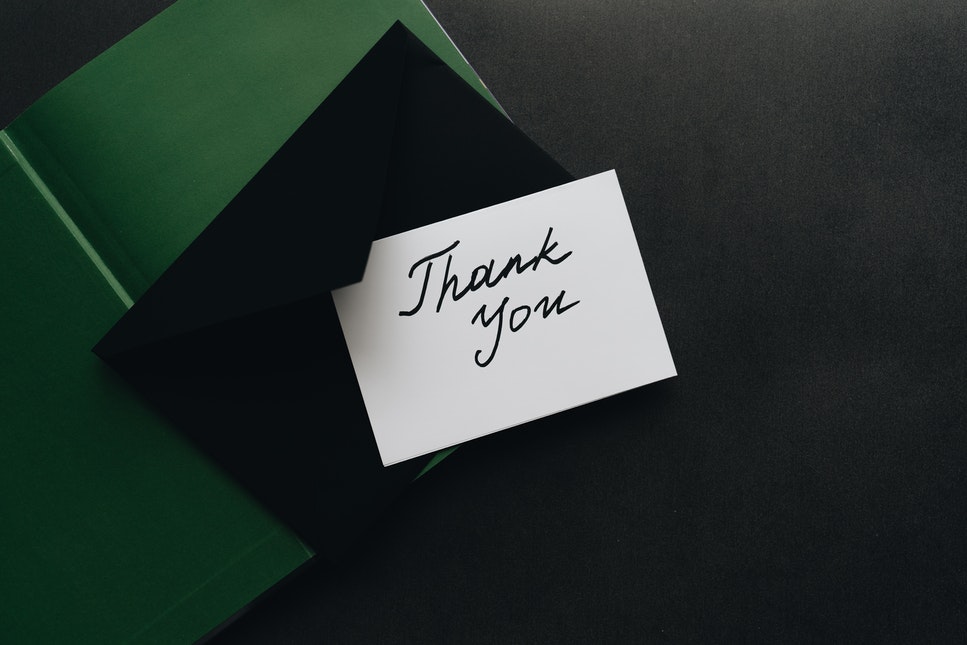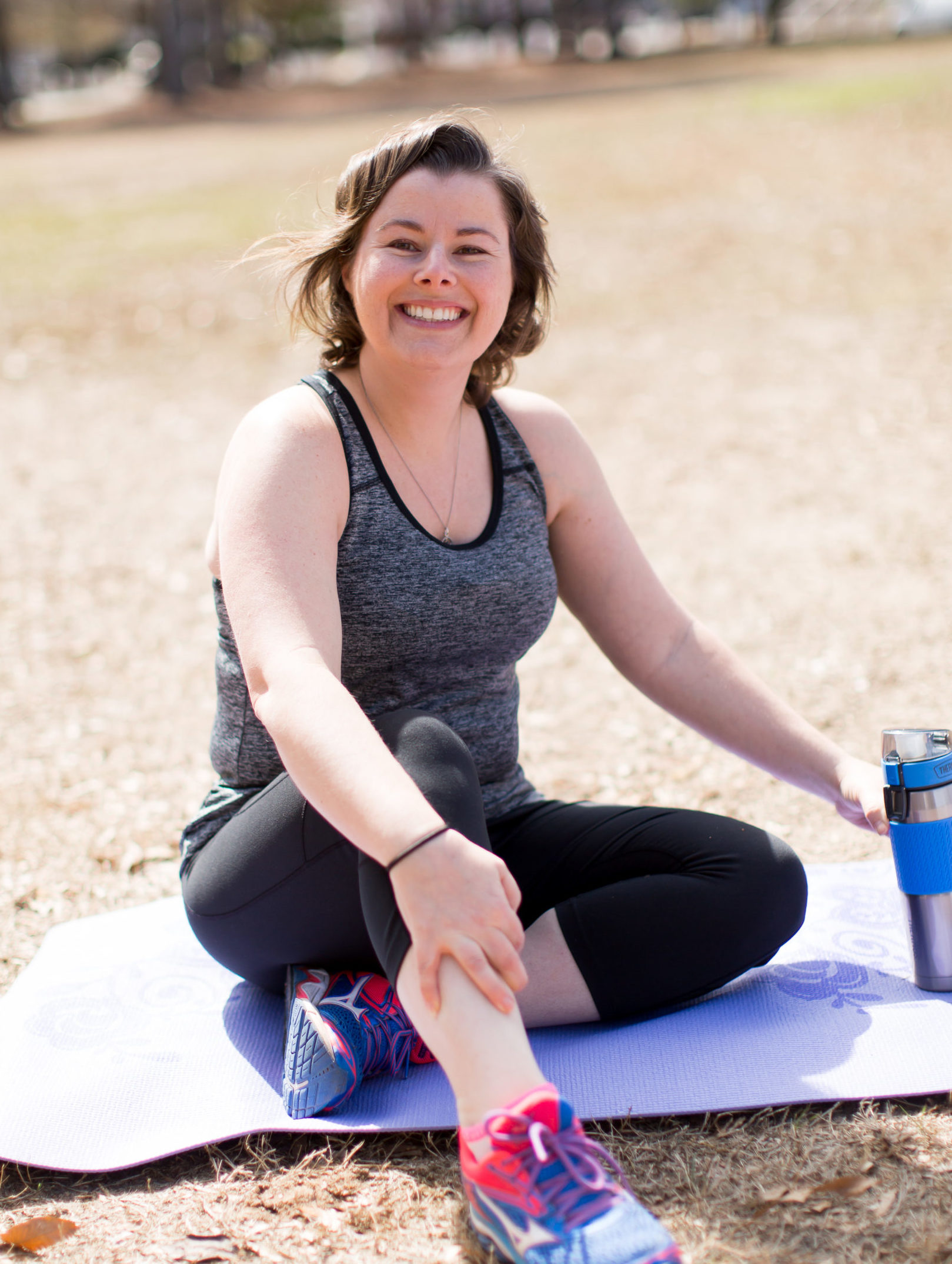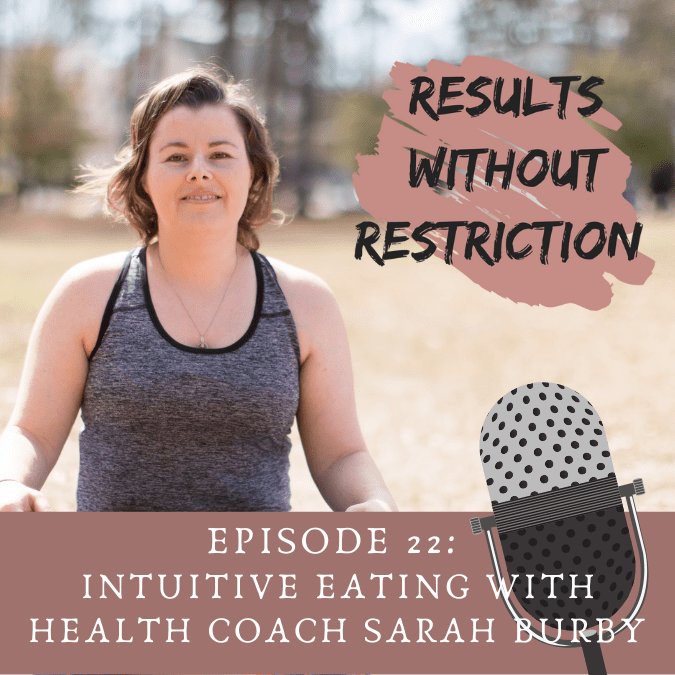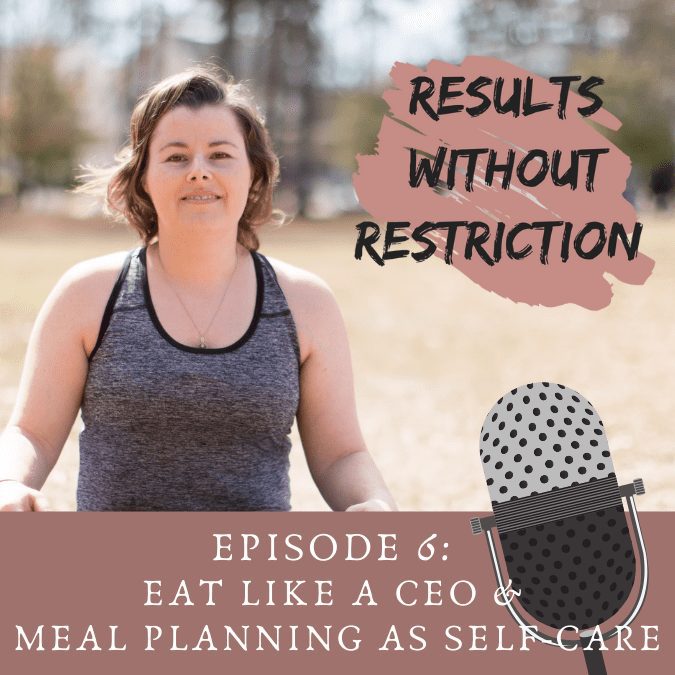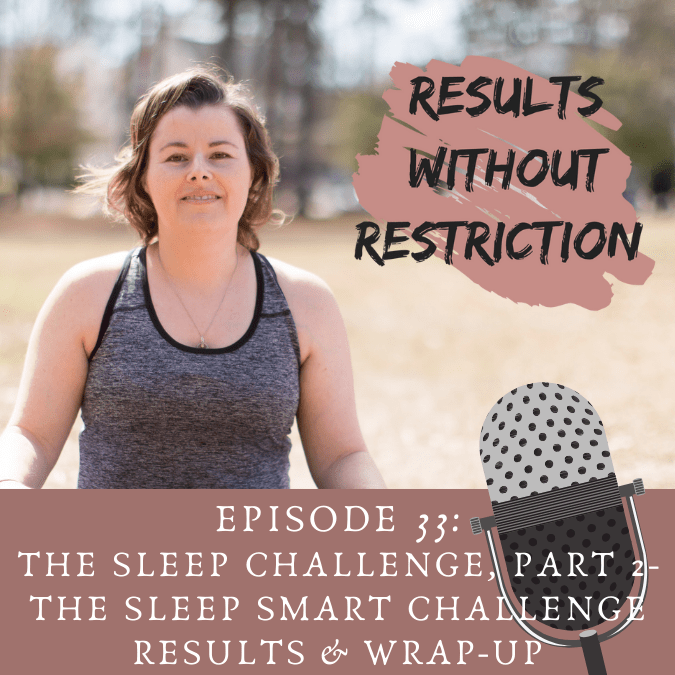Subscribe: Apple Podcasts | RSS
Ready to Undo your diet mindset?
In this episode I chat with Nourishment Strategist & Mindset coach, Shanique Allen. She’s on a mission to help women liberate themselves from the obsessive pursuits and mindset of diet culture so they can reclaim nourishment, health and joy in every aspect of their lives.
Table of Contents
Mentioned in this episode:
- Shanique’s Podcast: Undiet Yo’self
- Her website: www.shaniqueallen.com
- Apply to work with Shanique: UnDiet Your Nutrition Application
- Subscribe to Shanique’s Weekly Newsletter: Healthy Habits 365
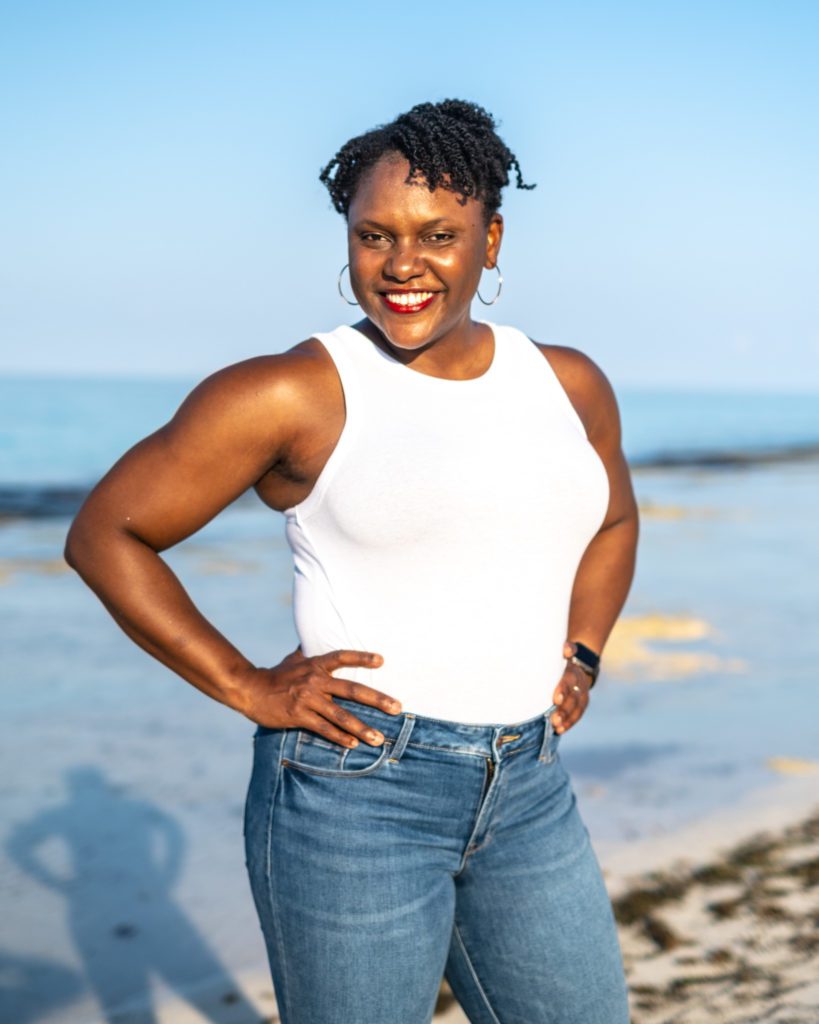
Connect with Shanique:
- Instagram: @shaniqueallen_
- Twitter:@shaniqueallen_
- Apple Podcasts: Undiet Yo’self
Episode Transcript
I’m Laurie Mallon and this is the Results Without Restriction podcast. The show where results have nothing to do with weight and everything to do with setting and reaching health and fitness goals that focus on what we’re achieving and not what we’re losing. We’ll talk about deprogramming from diet culture and get expert advice on reclaiming your relationship with food and movement.
Join me on this journey to get results without restriction. I am here with Shanique Allen who is a nourishment strategist and a mindset coach. Shanique is on a mission to help women liberate themselves from the obsessive pursuits and mindset of diet culture so that they can reclaim nourishment, health, and joy in every aspect of their lives.
Welcome Shanique. Thank you for having me on. I am so glad to be here with you.
I don’t meet as many people who are as, what’s the word, vociferous about being anti diet culture as I am. Like I know a lot of people kind of tiptoe around, okay we can talk about being healthy and we’re just not gonna talk about diets, we’re not gonna talk about, but you are, you are adamantly anti diet. You are like, we’re serious here.
We’re gonna take it head-on. We’re gonna talk about the damage that being, being exposed to diet culture messaging can have on our long-term wellness. So this is why I’m really, I’m really pumped to talk to you.
What I like to do first with all my guests, I like to dig into your backstory and what kind of brought you to this point. Well I’m gonna try to sum this up because that is one, like we could spend the entire time talking about that. But I call myself now a nourishment strategist and mindset coach and really what that is, is I kind of help people figure out how to nourish themselves in the simplest of ways possible that suit their life without the noise of diet culture and the toxic diet behaviors and restrictions in mind.
But really what I’m about is about changing everybody’s mind about what it means to pursue health and be your quote-unquote healthiest self. I’m a former athlete, former personal trainer and in a nutshell, I kind of went cold turkey in giving up all of that and all that I had learned up to that point about health and what it meant to pursue health. So two things that brought me here.
One, my own experience of burnout which I kind of mentioned to you in us talking before and a series of other life-changing transitions all at once while I was engaging in dieting and restrictive eating practices. And it became really overwhelming and was affecting my mental well-being in ways I hadn’t experienced before. I mean anxiety wasn’t something I had struggled with before and it wasn’t until starting to experience that that you know I started to recognize that kind of something was off.
But it came to a head when my mom got sick and I became her caretaker. Now I don’t know if you’ve ever heard caretakers talk but it can be a thankless and really stressful job. And it became clear to me in trying to rigidly micromanage my body through food and exercise and take care of myself and my mom, those two things were at odds.
And I wanted to be present because caretaking was a full time job mentally, physically, emotionally. And I also didn’t want to return to the life that I had experienced or to the burnout that I was actually just now recovering from at the time. So I decided to just ditch everything.
Go cold turkey. And I’m like I’m not gonna do this anymore. I had to at the same time broaden my perspective.
I started to ask questions. What does being healthy mean? Like what is that and what does that look like for me? What can that look like for me now given the fact that I no longer resonate with a lot of the things? Or I was now at odds with a lot of the things I had believed up until that point. So I had to broaden my perspective.
I started questioning some of the beliefs and paid more attention to the things that felt more nourishing to my body and my mind rather than following this set of rules that I had been following for years. And the things my body said it wanted were rest, gentleness, kindness, compassion. Did I say rest? Yeah that was one of those things because coming from hustle culture and diet culture it was no pain no gain.
More is better, right? So for me it was going against everything to slow down. Coming from burnout and especially burnout going through that, that was what forced my hand. Like I don’t want to go back there.
So that’s one. And then the second thing is in working with nutrition clients, much of their struggle was never about food or not about food at all. Rather it was about their mindset, the beliefs, the perspectives they had around health that led to habits around food and habits around themselves.
Certain habits general in life. So in trying to build different habits, much of the work centered around making space for things that added value, things they needed, things like rest, sleep, getting support or help, creating better boundaries. They incidentally knew a lot about food.
Like much like me, they had done the diets, they had gone through, you know, they’d explored the whole gamut. So they know what healthy, what quote-unquote healthy food is from their perspective. But also a lot of it was skewed around, you know, diet culture and what it should be versus what they could allow it to be given, where they were, what they had access to, those types of things.
And for what I recognize for most of them is that because in working on the beliefs and the perception and the mindset issues, when they felt out of control, cleaning up the diet and changing their body was the best way to reign things in, to reclaim some control. So in working through that, a lot of my clients recognized that it was not about the food, but it was about nourishment instead. So we started focusing on nourishment and the many ways it could look for them.
So that’s how I ended up doing the work that I’m doing now, helping clients explore nourishment from a place of self-awareness, from a place of compassion, a place of kindness versus a place of managing my body to fit an ideal. I want to thank you for your air quotes. I know listeners can’t hear it, but you did air quotes around when you said healthy and unhealthy food, because what does that even mean? We’ve been so indoctrinated with clean eating, alright, that’s air quotes, and what we should be eating.
And we’re kind of conditioned now to feel good and virtuous when we eat foods that have been classified as good or guilty or shameful when we eat the foods that are unhealthy or classified as bad. So I love that you are wagging your finger at the, we’re not doing the should thing, we’re not doing the healthy unhealthy classification here. And that it’s an individual approach, if I’m understanding you correctly, that each client, you’re not saying, listen, forget diet culture, but here’s this kind of general way we can approach this.
But you’re working with clients individually to say, listen, let’s figure out what feels good for you, provide you with nourishment, and not just food nourishment, emotional, physical rest, sleep, stress management strategy. So all of these things that are working together to help us feel better. Yeah.
The other thing that you said, and I have this conversation with so many people so often that when things feel out of control, when we feel overwhelmed and burnt out, when you’ve been in that diet cycle, you go straight to let me fix the body. Let me fix the food. Let me fix my let me get my food on track.
Let me get it under control. So that I now feel like I can handle everything else. Isn’t that so funny? Like that’s such a pervasive mindset and approach to what what we are reaction to to feeling kind of like that that out of control feeling with things going on in the last two years.
I mean, haven’t we all felt a little bit like things are kind of happening that we don’t have control over? So I can imagine you know, this is this is really big for your clients to have that kind of mindset shift to move away from let me focus on my food and my my physical appearance to get a handle on things to to kind of feel more in control about what’s happening in the world. I love that.
And I’m just gonna throw this into that you all you also have your own podcast and I’m going to be putting the link in the show notes so that my listeners can check out it’s called on diet yourself.
I love this so much. And so we’ll be linking to that too. So you can hear more about that.
Let’s dig in a little bit about what it looks like when you work with clients when you want to approach health, right? So a client wants to be healthier, they want to feel better. What does that look like? If you were to take like a sample client without a focus on weight and quantitatively food? What does that look like? Well, let me say to begin with, before we talk about health, wellness in general is a is the thing. It’s the thing that we want to, you know, bring to everyone’s attention.
So any client I work with, or anyone in general, when I speak to them, and they talk about quote, unquote, health, the assumption is that health is guaranteed, and you have full control over it. So it’s the thing you need to focus on. But let’s broaden it a little bit and say, let’s talk about your wellness.
And if we approach it from that perspective, you can see where health falls in to the whole, the whole picture. Because chances are a lot of people focus on health, when there are so many other aspects of their wellness that requires being addressed, that needs to be addressed. And they have trickle effects into health.
So we’re talking about your career, your spirituality, we’re talking about your physical well being, we’re talking about the social relationships that you have, we’re talking about your environment that you live in, we’re talking about, you know, what you have access to your, whether you’ll do home cooking or, or not, whether you have access to that, whether you’re financially stable.
So before we address health, one of the things I always want to, you know, get a pulse on or get a reading is let’s look out, let’s take a zoom out for a little bit, give me an idea of what your whole wellness is. And I, I tend to use a, what we call the circle of life.
And this is, this was coined from the Institute of integrative nutrition, where they have this whole circle of life. I mean, it’s split into different, like, I think it’s 12 of them. But what I do is get a, get a reading from folks, give me an idea of the things about your wellness and what you’re satisfied with and what you’re not satisfied with, or what are the things that are giving you joy, or you’re happy with, and what are the things that you’re not happy with.
And when they take that reading, then it gives me an idea, okay, well, guess what, now we’re going to need to define for you what it is that you want to work on, redefine your, your approach to your health through the lens of wellness. And when people do that, it kind of sets them back like, Hmm, I never thought of it this way. I was just focused on this one little tiny piece.
And then there are these 10 other things or 12 other things that I’ve not considered, which might have a significantly more important impact on my whole well-being. Because even though people talk about health, they then talk about well-being. And I’m like, well, well-being is your wellness.
This is the entirety of your being, not just your physical health, but all the other things that impact it. So how can we redefine it in the context of what is important for you and your total wellness. And then we can pick a few things to zone in on.
And I mentioned before that health is not guaranteed, nor is it something that you have total control of. And this is something I also bring to client’s attention because we’re talking about, sometimes you have people who have autoimmune conditions, some people you have certain conditions that you have zero control of. And no matter what you do with your health, the things you, the actions you take or the things you do, you’re not going to move that needle at all.
So we set that expectation at the beginning and said, okay, fine. And even if you do certain things, even if you don’t have those conditions, even if you do all these other things, there’s no guarantee that it’s going to lead you to this penultimate healthy destination. We’re using quotations here, quote unquote, healthy destinations, because that’s the thing about your health and your wellness.
There is no destination. There is no, I get to this place, sit down and put my feet up with a cocktail in my hand. That’s not what it is.
So I help clients take that broader look first and then zone in. And then the other thing I do is taking a look at the things that matter in their lives. What are the things that add value and how can we honor them as best as they possibly can? Recognizing that they will shift.
It’s not a matter of when or if, it’s that they will shift from season to season, or, you know, you move from one phase of life to another because no one stays static. And then what are the things that allow you to show up, not just as your best self, because there’s this emphasis on your best self and we all can’t be our best selves every single day and to want that and to think that is something I think we set ourselves up for, not failure so much as disappointment.
I invite people instead to be your whole self because it includes the days you are your best and the days you’re not and how you can show up even in those not so best, quote unquote, best days.
Because when you remove your hand size or your weight on the scale or the number on the scale, you will find that they do not hold the key the way that culture has tricked us into believing. So health in and of itself within the context of wellness is just one small piece that wellness covers a lot of things. And even health, if we’re looking at health specifically, it will differ for everyone.
It will look different than everyone and there’s no one way to approach it. So in a nutshell, when you ask me about how I approach health without a focus on weight, I zoom out first before I can zoom in. I love that because this takes into account everything because we can’t just look at things piece by piece.
It’s a holistic approach. And when you move something over here, it impacts something else over there. You’re taking their individual assessment for what’s important to them right now.
How do they want to show up better? How do they want to feel better in their lives, not just physically? Taking a holistic approach makes you a little more adaptable and resilient, capable of weathering shifting seasons. And the reason I say that is because one thing I noticed about those who are focused entirely on just diet and exercise is that when season shift, life shift, life transition happens, that becomes like carrying water in a wicker basket.
Can’t hold because that’s the only thing they know, whereas other things might be required.
So if we’re taking that broad picture approach and drilling inwards, it’s easier or I’m using easier loosely here, because easy is relative. But it’s a lot more, you have more tools in your in your bank, basically, to adapt to, you know, be more resilient when the seasons shift. And that’s something that I experienced and it’s something I have my clients experience.
When things shift, they’re like, Oh, God, what do I do? No, my diet is off, my exercise is off. What do I do when those aren’t the only two things? There are other things that might benefit once those shifts happen. So I want to highlight that holistic approach kind of lends itself to a little more adaptability and resiliency in folks.
What would you say are some mistakes that people make when it comes to approaching their health or their wellness? Or myths that they’re believing outside of like the obvious, you know, your weight is your health and things like that. What are the things that people come to you and they’re like, Okay, I did not, I was not doing that. I didn’t even think of that.
Number one is thinking they need to overall, then it needs, there needs to be a overall for it to be impactful, like burn the house down. Now granted, there’s some instances and in some cases, that just happens. I mean, I’m a classic example, I literally burnt everything I knew to the ground, like I’m going to go the opposite direction, cold turkey and go the opposite.
But I probably sometimes say maybe I was in the middle of a existential crisis at the time. And sometimes it’s warranted. But for the most part, when it comes to improving, quote, unquote, health, people are of the misconception that it needs to be this grand gesture, this grand overall, they need to burn everything to the ground.
And then, you know, suddenly, they’ll just have this quote, unquote, discipline and willpower to make their way through all these know, this tunnel that they’ve now set them to put themselves in because I call it a tunnel. Because they’re the rules are the walls of this tunnel, I would say. And they just going to go down this tunnel.
And it’s going to lead them to this bright open field of all their dreams. Rubbish. No.
No, if you can picture it, can you? Yes. And you know what, I’ve been in this I’ve been in this imagined I’ve pictured myself in this imaginary tunnel that all I have to do is stay in this tunnel, stay in the walls. And then at the end, all my dreams come true.
It’s magical. I’m leaping through a field like, like the lady from what do you call it? Sound of music? Sound of music? Yes. Thank you.
Yes. Like that’s me. The hills are alive.
All my dreams are coming true. Everything is fantastic. I love everyone.
No one’s annoying me. Yes. And then I just live happily ever after.
And I understand everything that you’re everything you’re saying is like hitting home for me. Definitely. So it’s instead of burn it down, take on a whole new lifestyle where this is how we’re living now.
And this is what we’re doing. And then we’re getting in the tunnel. And then life is great.
Small changes, small, simple. And I don’t want to say it’s not stupid. And people say it’s so it’s so small.
It’s stupid. I’m not going to say that because no, none of these changes that you make are stupid. If there are changes that one you can do, that’s impactful.
And I mean, it’s so tiny, you think it’s irrelevant. And I’ll give you an example of something that’s super tiny. One simple, tiny, tiny thing is misconception.
People need to add vegetables to all of their meals. Like, okay, I need to have vegetables, every single meal, like a serving of, you know, steamed vegetables or raw salad or whatnot. When if they look at maybe say somebody makes a stew, you’ve already have vegetables in a stew.
A stew hardly is ever made without vegetables. And I’m like, let’s let’s just change your perspective. Instead of thinking you need to add necessarily this whole new salad to your stew, you’re having stew, okay, I need to have a salad too to make it worth it or to make it quote unquote count.
What about all those vegetables you do have in that stew? So notice no change has been made here. It’s just reframing, you know, what you think, quote unquote, healthy eating needs to be. And if a stew has vegetables, it’s loaded with onions, tomatoes, it’s got your beans, it’s got, it’s got so much nutrition already in it, that you feel like, okay, it’s not enough, because I need to add some vegetables.
Let’s rethink that. But don’t you already have vegetables in there. So you’ve already, you’re already giving yourself the best nutrition possible.
So when I say making, you know, small steps, it’s not just about necessarily adding something or changing something. But it’s literally changing the way you look at something. So that’s, that’s, that’s one thing, you know, health, the mistake that and it’s worth talking about is narrowing it down to diet and exercise that that is the end all be all of improving your health.
And it happens very often people go into the doctor’s office, and that’s the first recommendation that’s made. And tie that into that is the whole equating your health to the size of your body. If you have an ailment, or if you you have some thing pops up on your doctor’s like, well, you know, you need to work on the weight or it needs to be exercised.
And like, why is that the first thing? So it’s challenging those things. First of all, your weight is not a behavior. That’s the first thing.
How about we talk about health promoting behavior as well. So it’s the mistake people make, I want to say here is narrowing down, working on your health or improving your health to just diet and exercise as the only two things you can do when there are so many other things.
So take a broader look to the other mistake that people make when it comes to improving their health, is that you need to and I see this often is that there is a certain sense of moral climbing, that if you’re working on whatever it is you’re working on, and you’re suddenly now improving, then it makes you better than somebody else who is not.
And you will see this and people are not aware of it, because people will say it in some very insidious ways without even realizing how impactful it is not just to them, because if you’re judging yourself that way, you’re judging everybody else that way. So it’s recognizing improving your health means coming off of that moral pedestal that that culture tends to put. The efforts you make to improve your health suddenly makes you superior to other people.
And that’s a mistake that’s not just made once you’re in there, it’s made even before you get there, because people think she’s better than me, because she’s working on that. And then when you make improvements, you’re now suddenly better than somebody else. So that’s another big mistake that I see.
And it’s under the guise of, you know, I want to motivate people or I want to help others, but it comes across as judgment. Absolutely. Some internalized healthism there that we’re all we’re all under this obligation.
You don’t owe getting healthy to anyone, anyone at all. So I love that you brought that up, because I feel like that particular message is something we need to be talking about that moral high ground. And the thing is, people will not, people will say or people doing that will not think that they’re taking that stance.
I might, well, how can you not? Because if you are, you know, doing this thing, and it’s creating this change in you, your statement is, well, if I can do it, you can too. Suggesting that by not doing it, then, hmm, you don’t want it, you’re less than. So we have to be aware of that, but also the language.
And this might be a separate point. The language we use around our health, our bodies, ourselves, is one way to shift our health. And I’ll tie that to examining the relationships that you do have.
Toxic ones, for instance. Examining those things, because those words matter. And they matter not just to who you say them to, but if you say them to yourself.
Again, I go back to saying, if you think this of yourself, you judge yourself one way, you judge other people. So if you use words to yourself, what’s to stop you from using it? Or it’s ingrained that you might just end up using it to define or describe other people, or use it to, or say it to other people. Moms do this with their kids.
Friends do this with, you know, with each other. The, I know in the Black diaspora, or the Caribbean diaspora, or even I forget the diaspora, but where I’m from, mentioning somebody’s weight as a form of greeting is normal. Like, you know, they will talk about your weight openly and, you know, quite condescendingly.
And that’s normal. And it’s a conversation. And you’re sensitive if you bring up any, you know, resistance to that.
So environment is something to examine. So examining your environment, watching your words and your language, not narrowing down health to just diet and exercise, and taking small tiny steps or looking for small adjustments or small shifts, either in habits, or in deed and in mindset. I love that you brought up talking about other people’s bodies, shapes and sizes and changes therein.
I would love if we could just normalize not pointing this out as a good or a bad, you have no idea what’s happening behind the scenes. Let’s just not. It’s very ingrained, we would love to see it.
But the reality is, it is so ingrained. There are several ways we’ll need to address that. Because like I said, it’s in different cultures.
I mean, societally, it’s just a normal thing to do. Comedians joke about people’s weight on stage, people make self deprecating statements about themselves. It’s in the advertisements, it’s in the books that you read, it’s just pervasive.
And by us talking about it is one way to address it. And calling it out also, we have to be cognizant though, that there are people who don’t feel safe in doing that. So we have to recognize that that’s a whole other element to just shifting the conversation around challenging diet culture in general, that not everybody is in a safe space.
And safety is important to a lot of the things that we can and should do. And it applies to health as well. Accessing health or, you know, it’s not people aren’t always in a safe environment to even think that, you know, going to the gym is possible or even have access to the gym.
Some people just do not. And we have to be cognizant of that as well. I like to call it privilege, privilege of safety, which we do not all have.
And those as practitioners and us working in the space, it’s important that we acknowledge that and we call it out, because that’s the only way that we’re gonna start shifting the dynamic and the narrative. Okay, that could be its own episode. I do love that you brought that up.
And that is a really important point. I’d love to talk now about what it looks like to work with you in terms of the programs that you offer as a coach. The main way that people work with me is to apply to work with my On Diet Your Nutrition framework.
So this framework is really for women going into or finding themselves in new and different phases. I love talking about phases just because I’ve been through them and I know women especially go through them. And you realize your whole health matters more than restricted food or punishing your body.
And you want to support and the guidance to explore and nourish those other aspects. This is the one-on-one coaching program that I offer. I also offer a short-term single session.
It’s called the Nourishment Strategy Session. And those are for busy folks or folks who already know they know quite a bit about nutrition. But they’re feeling a bit overwhelmed about nourishing themselves right now.
They know all the things. These are the people who know all the things like, okay, where should I be going? Or what do I need to be doing now, given either, you know, they’re busy or they’ve had so much change recently, and they want a strategy to make it simpler. So those Nourishment Strategy Sessions are available.
Those are one-off sessions. And then you have applications to my On Diet Your Nutrition program. Perfect.
So you have resources and services available for people wherever they are kind of on this journey. If they are ready to get started, they can apply, you know, have a call with you and see if you guys are a good fit to, to start working together. If somebody is kind of in information overwhelm, they know all the things.
They’re like, look, I just kind of need one and done to get pointed in the right direction. They can connect with you on that. And then you also have your newsletter where you are showing up weekly and you are providing tons of value and helpful information.
And I, you mentioned it earlier, my podcast, which is out, Season 1 is out, Season 2 is coming up in two weeks, On Diet Yourself. It’s a podcast about shedding the weight of diet culture rules, learning to tap into your body’s needs, nourish it with peaceful eating habits, and reclaiming trust in yourself.
You can find it on Apple, Spotify, Google Podcasts. Fantastic. Shanique, what I’m going to do is I’m going to put a link to join your email list.
The link to your podcast and a link for the application and also to schedule a session with you. The last thing I do, and I’d like to finish with your top three tips. One, include more risk, taking time off to do nothing or don’t regulate.
Improve your quality of sleep if it can’t affect the quantity. That’s something that I, you know, people seem to think that I just need to sleep more when quality can also be positively impacting. Two, setting boundaries.
Recognize your limits and your boundaries. Start honoring them and enforcing them. Become your biggest advocate.



